The Four WindsHardcover
4.6
-
156,242 ratings
"The Bestselling Hardcover Novel of the Year."--Publishers Weekly
From the number-one bestselling author of The Nightingale and The Great Alone comes a powerful American epic about love and heroism and hope, set during the Great Depression, a time when the country was in crisis and at war with itself, when millions were out of work and even the land seemed to have turned against them.
“My land tells its story if you listen. The story of our family.”
Texas, 1921. A time of abundance. The Great War is over, the bounty of the land is plentiful, and America is on the brink of a new and optimistic era. But for Elsa Wolcott, deemed too old to marry in a time when marriage is a woman’s only option, the future seems bleak. Until the night she meets Rafe Martinelli and decides to change the direction of her life. With her reputation in ruin, there is only one respectable choice: marriage to a man she barely knows.
By 1934, the world has changed; millions are out of work and drought has devastated the Great Plains. Farmers are fighting to keep their land and their livelihoods as crops fail and water dries up and the earth cracks open. Dust storms roll relentlessly across the plains. Everything on the Martinelli farm is dying, including Elsa’s tenuous marriage; each day is a desperate battle against nature and a fight to keep her children alive.
In this uncertain and perilous time, Elsa―like so many of her neighbors―must make an agonizing choice: fight for the land she loves or leave it behind and go west, to California, in search of a better life for her family.
The Four Winds is a rich, sweeping novel that stunningly brings to life the Great Depression and the people who lived through it―the harsh realities that divided us as a nation and the enduring battle between the haves and the have-nots. A testament to hope, resilience, and the strength of the human spirit to survive adversity, The Four Winds is an indelible portrait of America and the American dream, as seen through the eyes of one indomitable woman whose courage and sacrifice will come to define a generation.
Read more
Kindle
$11.99
Available instantly
Audiobook
$0.00
with membership trial
Hardcover
$11.29
Paperback
$11.29
Ships from
Amazon.com
Payment
Secure transaction
ISBN-10
1250178614
ISBN-13
978-1250178619
Print length
480 pages
Language
English
Publisher
Griffin
Publication date
March 13, 2023
Dimensions
5.45 x 1.2 x 8.2 inches
Item weight
15.4 ounces
Popular highlights in this book
A warrior believes in an end she can’t see and fights for it. A warrior never gives up. A warrior fights for those weaker than herself. It sounds like motherhood to me.
Highlighted by 10,421 Kindle readers
Apparently you couldn’t stop loving some people, or needing their love, even when you knew better.
Highlighted by 7,038 Kindle readers
It wasn’t the fear that mattered in life. It was the choices made when you were afraid. You were brave because of your fear, not in spite of it.
Highlighted by 7,022 Kindle readers
Product details
ASIN :
B087ZXSPGJ
File size :
15207 KB
Text-to-speech :
Enabled
Screen reader :
Supported
Enhanced typesetting :
Enabled
X-Ray :
Enabled
Word wise :
Enabled
Editorial reviews
"The Bestselling Hardcover Novel of the Year."--Publishers Weekly
Book of the Month Club's Best Book of 2021
Selected for The Texas Library Association's 2022 Lariat Adult Fiction Reading List
"The Four Winds seems eerily prescient in 2021 . . . Its message is galvanizing and hopeful: We are a nation of scrappy survivors. We’ve been in dire straits before; we will be again. Hold your people close.”―The New York Times
"A spectacular tour de force that shines a spotlight on the indispensable but often overlooked role of Greatest Generation women."―People
"Brutally beautiful."―Newsweek
"Epic and transporting, a stirring story of hardship and love...Majestic and absorbing."―USA Today
"Through one woman’s survival during the harsh and haunting Dust Bowl, master storyteller, Kristin Hannah, reminds us that the human heart and our Earth are as tough, yet as fragile, asa change in the wind. This mother’s soul, suffering the same drought as the land, attempts to cross deserts and beat starvation to save her children with a fierce inner strength called motherhood. A timely novel highlighting the worth and delicate nature of Nature itself." ―Delia Owens, author of WHERE THE CRAWDADS SING
"A powerful, stirring, wind-swept tale set in Depression-era America that makes your heart break and soar in equal measure. An escape into the past with timely echoes to the present. Kristin Hannah is a classic storyteller and The Four Winds sees her at the top of her game.” -- MATT HAIG, <u>New York Times</u> bestselling author of THE MIDNIGHT LIBRARY
"Wow. I have been left with a bursting heart. Prepare to go on a journey. The story of Elsa and her family will sweep you up on its wings and plunge you to the depths of feeling. This novel is crucial for our times: although set during the Great Depression and the terrible dust bowls, it holds up a mirror to our current world and asks us to look and to understand deeply. It is a story of migration, poverty, prejudice - it shines a light on a crisis that is all too real in today’s world. Yet, it is also a story of love, family, unbreakable bonds, bravery and hope. I will never forget the characters, what they endured and how they hoped and loved. I feel that I will be forever touched by them. I loved this book so much!" --Christy Lefteri, author of THE BEEKEEPER OF ALEPPO
"The Four Winds by Kristin Hannah is a captivating, heartbreaking tale of a family who will do anything for each other ― and everything to survive. The strength of Hannah’s prose brings the characters to life in a way that will make you unable to tear yourself away from them. You will celebrate their triumphs, mourn their tragedies, and commend their bravery.
Through it all, it is easy to feel Hannah’s desire to honor those who lived and fought through this devastating time in history. The Four Winds is also an ode to the strength and ferocity of mothers, and a declaration that sometimes, love is the only thing that holds us together.
Above all else, The Four Winds is merely a really good story, one that hits you in all the right places and will keep surprising you until the end."―Associated Press
"One woman’s journey exemplifies the hard choices families faced when confronted with survival versus a sense of home."―GoodMorningAmerica.com
"Hannah brings Dust Bowl migration to life in this riveting story of love, courage, and sacrifice...combines gritty realism with emotionally rich characters and lyrical prose that rings brightly and true from the first line"― Publishers Weekly (starred review)
"Outstanding.... [A] rich, rewarding read about family ties, perseverance, and women's friendships and fortitude." ― Booklist (starred review)
"The Four Winds is a sweeping epic about an American struggling to keep her family afloat. It feels eerily timely as it highlights the ways women rally during a national crisis."―Real Simple
"A heartbreaking but beautiful story of sacrifice, courage, love, and hope. Grab the tissues."―The Skimm
Read more
Sample
ONE
Elsa Wolcott had spent years in enforced solitude, reading fictional adventures and imagining other lives. In her lonely bedroom, surrounded by the novels that had become her friends, she sometimes dared to dream of an adventure of her own, but not often. Her family repeatedly told her that it was the illness she’d survived in childhood that had transformed her life and left it fragile and solitary, and on good days, she believed it.
On bad days, like today, she knew that she had always been an outsider in her own family. They had sensed the lack in her early on, seen that she didn’t fit in.
There was a pain that came with constant disapproval; a sense of having lost something unnamed, unknown. Elsa had survived it by being quiet, by not demanding or seeking attention, by accepting that she was loved, but unliked. The hurt had become so commonplace, she rarely noticed it. She knew it had nothing to do with the illness to which her rejection was usually ascribed.
But now, as she sat in the parlor, in her favorite chair, she closed the book in her lap and thought about it. The Age of Innocence had awakened something in her, reminded her keenly of the passage of time.
Tomorrow was her birthday.
Twenty-five.
Young by most accounts. An age when men drank bathtub gin and drove recklessly and listened to ragtime music and danced with women who wore headbands and fringed dresses. For women, it was different.
Hope began to dim for a woman when she turned twenty. By twenty-two, the whispers in town and at church would have begun, the long, sad looks. By twenty-five, the die was cast. An unmarried woman was a spinster. “On the shelf,” they called her, shaking heads and tsking at her lost opportunities. Usually people wondered why, what had turned a perfectly ordinary woman from a good family into a spinster. But in Elsa’s case, everyone knew. They must think she was deaf, the way they talked about her. Poor thing. Skinny as a rake handle. Not nearly as pretty as her sisters.
Prettiness. Elsa knew that was the crux of it. She was not an attractive woman. On her best day, in her best dress, a stranger might say she was handsome, but never more. She was “too” everything—too tall, too thin, too pale, too unsure of herself.
Elsa had attended both of her sisters’ weddings. Neither had asked her to stand with them at the altar, and Elsa understood. At nearly six feet, she was taller than the grooms; she would ruin the photographs, and image was everything to the Wolcotts. Her parents prized it above all else.
It didn’t take a genius to look down the road of Elsa’s life and see her future. She would stay here, in her parents’ house on Rock Road, being cared for by Maria, the maid who’d managed the household forever. Someday, when Maria retired, Elsa would be left to care for her parents, and then, when they were gone, she would be alone.
And what would she have to show for her life? How would her time on this earth be marked? Who would remember her, and for what?
She closed her eyes and let a familiar, long-held dream tiptoe in: She imagined herself living somewhere else. In her own home. She could hear children’s laughter. Her children.
A life, not merely an existence. That was her dream: a world in which her life and her choices were not defined by the rheumatic fever she’d contracted at fourteen, a life where she uncovered strengths heretofore unknown, where she was judged on more than her appearance.
The front door banged open and her family came stomping into the house. They moved as they always did, in a chattering, laughing knot, her portly father in the lead, red-faced from drink, her two beautiful younger sisters, Charlotte and Suzanna, fanned out like swan wings on either side of him, her elegant mother bringing up the rear, talking to her handsome sons-in-law.
Her father stopped. “Elsa,” he said. “Why are you still up?”
“I wanted to talk to you.”
“At this hour?” her mother said. “You look flushed. Do you have a fever?”
“I haven’t had a fever in years, Mama. You know that.” Elsa got to her feet, twisted her hands together, and stared at the family.
Now, she thought. She had to do it. She couldn’t lose her nerve again.
“Papa.” At first she said it too softly to be heard, so she tried again, actually raising her voice. “Papa.”
He looked at her.
“I will be twenty-five tomorrow,” Elsa said.
Her mother appeared to be irritated by the reminder. “We know that, Elsa.”
“Yes, of course. I merely want to say that I’ve come to a decision.”
That quieted the family.
“I … There’s a college in Chicago that teaches literature and accepts women. I want to take classes—”
“Elsinore,” her father said. “What need is there for you to be educated? You were too ill to finish school as it was. It’s a ridiculous idea.”
It was difficult to stand there, seeing her failings reflected in so many eyes. Fight for yourself. Be brave.
“But, Papa, I am a grown woman. I haven’t been sick since I was fourteen. I believe the doctor was … hasty in his diagnosis. I’m fine now. Truly. I could become a teacher. Or a writer…”
“A writer?” Papa said. “Have you some hidden talent of which we are all unaware?”
His stare cut her down.
“It’s possible,” she said weakly.
Papa turned to Elsa’s mother. “Mrs. Wolcott, give her something to calm her down.”
“I’m hardly hysterical, Papa.”
Elsa knew it was over. This was not a battle she could win. She was to stay quiet and out of sight, not to go out into the world. “I’m fine. I’ll go upstairs.”
She turned away from her family, none of whom was looking at her now that the moment had passed. She had vanished from the room somehow, in that way she had of dissolving in place.
She wished she’d never read The Age of Innocence. What good came from all this unexpressed longing? She would never fall in love, never have a child of her own.
As she climbed the stairs, she heard music coming from below. They were listening to the new Victrola.
She paused.
Go down, pull up a chair.
She closed her bedroom door sharply, shutting out the sounds from below. She wouldn’t be welcomed down there.
In the mirror above her washstand, she saw her own reflection. Her pale face looked as if it had been stretched by unkind hands into a sharp chin point. Her long, corn-silk blond hair was flyaway thin and straight in a time when waves were all the rage. Her mother hadn’t allowed her to cut it in the fashion of the day, saying it would look even worse short. Everything about Elsa was colorless, washed out, except for her blue eyes.
She lit her bedside lamp and withdrew one of her most treasured novels from her nightstand.
Memoirs of a Woman of Pleasure.
Elsa climbed into bed and lost herself in the scandalous story, felt a frightening, sinful need to touch herself, and almost gave in. The ache that came with the words was almost unbearable; a physical pain of yearning.
She closed the book, feeling more outcast now than when she’d begun. Restless. Unsatisfied.
If she didn’t do something soon, something drastic, her future would look no different from her present. She would stay in this house for all her life, defined day and night by an illness she’d had a decade ago and an unattractiveness that couldn’t be changed. She would never know the thrill of a man’s touch or the comfort of sharing a bed. She would never hold her own child. Never have a home of her own.
THAT NIGHT, ELSA WAS plagued by longing. By the next morning, she knew she had to do something to change her life.
But what?
Not every woman was beautiful, or even pretty. Others had suffered childhood fevers and gone on to live full lives. The damage done to her heart was all medical conjecture as far as she could tell. Not once had it failed to beat or given her cause for real alarm. She had to believe there was grit in her, even if it had never been tested or revealed. How could anyone know for sure? She had never been allowed to run or play or dance. She’d been forced to quit school at fourteen, so she’d never had a beau. She’d spent the bulk of her life in her own room, reading fictional adventures, making up stories, finishing her education on her own.
There had to be opportunities out there, but where would she find them?
The library. Books held the answer to every question.
She made her bed and went to the washstand and combed her waist-length blond hair into a deep side part and braided it, then dressed in a plain navy-blue crepe dress, silk stockings, and black heels. A cloche, kid gloves, and a handbag completed her outfit.
She went down the stairs, grateful that her mother was still asleep at this early morning hour. Mama didn’t like Elsa exerting herself except for Sunday church services, at which Mama always asked the congregation to pray for Elsa’s health. Elsa drank a cup of coffee and headed out into the sunshine of a mid-May morning.
The Texas Panhandle town of Dalhart stretched out in front of her, wakening beneath a bright sun. Up and down the wooden boardwalks, doors opened, CLOSED signs were turned around. Beyond town, beneath an immense blue sky, the flat Great Plains stretched forever, a sea of prosperous farmland.
Dalhart was the county seat, and these were booming economic times. Ever since the train had been routed through here on its way from Kansas to New Mexico, Dalhart had expanded. A new water tower dominated the skyline. The Great War had turned these acres into a gold mine of wheat and corn. Wheat will win the war! was a phrase that still filled the farmers with pride. They had done their part.
The tractor had come along in time to make life easier, and good crop years—rain and high prices—had allowed farmers to plow more land and grow more wheat. The drought of 1908, long talked about by old-timers, had been all but forgotten. Rain had fallen steadily for years, making everyone in town rich, none more so than her father, who took both cash and notes for the farm equipment he sold.
Farmers gathered this morning outside the diner to talk about crop prices, and women herded their children to school. Only a few years ago, there had been horse-and-buggies in the streets; now automobiles chugged their way into the golden, glowing future, horns honking, smoke billowing. Dalhart was a town—fast becoming a city—of box suppers and square dances and Sunday morning services. Hard work and like-minded people creating good lives from the soil.
Elsa stepped up onto the boardwalk that ran alongside Main Street. The boards beneath her feet gave a little with each step, made her feel as if she were bouncing. A few flower boxes hung from stores’ eaves, adding splashes of much-needed color. The town’s Beautification League tended them with care. She passed the savings and loan and the new Ford dealership. It still amazed her that a person could go to a store, pick out an automobile, and drive it home the same day.
Beside her, the mercantile opened its doors and the proprietor, Mr. Hurst, stepped out, holding a broom. He was wearing shirtsleeves rolled up to expose his beefy forearms. A nose like a fire hydrant, squat and round, dominated his ruddy face. He was one of the richest men in town. He owned the mercantile, the diner, the ice-cream counter, and the apothecary. Only the Wolcotts had been in town longer. They, too, were third-generation Texans, and proud of it. Elsa’s beloved grandfather, Walter, had called himself a Texas Ranger until the day he died.
“Hey, Miss Wolcott,” the storekeeper said, pushing the few strands of hair he still had away from his florid face. “What a beautiful day it’s looking to be. You headed to the library?”
“I am,” she answered. “Where else?”
“I have some new red silk in. Tell your sisters. It would make a fine dress.”
Elsa stopped.
Red silk.
She had never worn red silk. “Show me. Please.”
“Ah! Of course. You could surprise them with it.”
Mr. Hurst bustled her into the store. Everywhere Elsa looked, she saw color: boxes full of peas and strawberries, stacks of lavender soap, each bar wrapped in tissue paper, bags of flour and sugar, jars of pickles.
He led her past sets of china and silverware and folded multicolored tablecloths and aprons, to a stack of fabrics. He rifled through, pulled out a folded length of ruby-red silk.
Elsa took off her kid gloves, laid them aside, and reached for the silk. She had never touched anything so soft. And today was her birthday.…
“With Charlotte’s coloring—”
“I’ll take it,” Elsa said. Had she put a slightly rude emphasis on I’ll? Yes. She must have. Mr. Hurst was eyeing her strangely.
Mr. Hurst wrapped the fabric in brown paper and secured it with twine and handed it to her.
Elsa was just about to leave when she saw a beaded, glittery silver headband. It was exactly the sort of thing the Countess Olenska might wear in The Age of Innocence.
Read more
About the authors
Kristin Hannah
Kristin Hannah is the award-winning and bestselling author of more than 20 novels. Her newest novel, The Women, about the nurses who served in the Vietnam war, will be released on February 6, 2024.
The Four Winds was published in February of 2021 and immediately hit #1 on the New York Times, Wall Street Journal, USA Today, and Indie bookstore's bestseller lists. Additionally, it was selected as a book club pick by the both Today Show and The Book Of the Month club, which named it the best book of 2021.
In 2018, The Great Alone became an instant New York Times #1 bestseller and was named the Best Historical Novel of the Year by Goodreads.
In 2015, The Nightingale became an international blockbuster and was Goodreads Best Historical fiction novel for 2015 and won the coveted People's Choice award for best fiction in the same year. It was named a Best Book of the Year by Amazon, iTunes, Buzzfeed, the Wall Street Journal, Paste, and The Week.
The Nightingale is currently in pre-production at Tri Star. Firefly Lane, her beloved novel about two best friends, was the #1 Netflix series around the world, in the week it came out. The popular tv show stars Katherine Heigl and Sarah Chalke.
A former attorney, Kristin lives in the Pacific Northwest.
Read more
Reviews
Customer reviews
4.6 out of 5
156,242 global ratings
Jjspina
5
An unforgettable historical novel of epic proportions!
Reviewed in the United States on June 3, 2024
Verified Purchase
The Four Winds is an epic historical novel that takes the reader back to The Great Depression and a family who suffered through it all. This involves the greatest generation of all, for they were the strongest, most resilient and determined to make a life for themselves despite the dire circumstances of nature, other events, and heartache.
This was a tough book to read because it involved so much heartbreak as the author takes us through the daily life of this family and all their struggles. The main protagonist Elsa is a woman who has been unloved by her family, mistreated by her husband and not accepted by her daughter. All Elsa wants is to love and be loved, something that she has desperately needed all her life. She struggles to be a good wife, mother, and eventual daughter-in-law when she moves in with her in-laws after being ostracized by her parents when she realizes she is pregnant.
Elsa discovers that she is loved and needed by her mother- and father-in-law but not appreciated by her husband for what she is, a hard worker who is determined to make a good life for herself and her family. It was difficult to watch Elsa with her struggles and how she never gave up even after her husband abandoned her and their two children.
There is mention of how the immigrants from one state to another were mistreated and shunned by others, exploited by the cotton and fruit plantations, and forced to grovel and somehow survive reminiscent of some of the problems in our society today.
An unforgettable and epic read that I highly recommend. Be prepared to feel the heart wrenching despair of the characters told expertly through this amazing author's prose.
Read more
2 people found this helpful
diane millican
5
Just Kept Reading
Reviewed in the United States on May 26, 2024
Verified Purchase
This book sent me to Google many times, for visuals, images, facts. This story is gripping and harsh and sad. The characters are strong, determined, real. I didn’t get much finished on my “to do” list the last three days because the characters kept calling me back.
5 people found this helpful
Sammy Midlet
5
Its long, it’s heartbreaking, and it drags.
Reviewed in the United States on March 14, 2024
Verified Purchase
I think Kristen Hanna is a good author, in general, but I think that this book was too long, too drawn out, the suffering seemed to never end.. but of course, it wrapped up very nicely at the very end. I felt like I would never get to the end of it. It was very descriptive and no doubt very authentically historical. But I couldn’t wait to finish it and I only did because I needed to, Just because I had invested so much time in it. I did not expect it to get better, and it did not . It’s much like the classic grapes of wrath, but not nearly as well written. overall, I was disappointed. I feel like she had felt that she needed to write another book- and this is what it was.
Read more
14 people found this helpful
Top Kristin Hannah titles
View all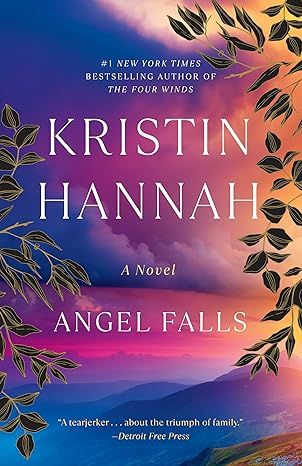
Angel Falls: A Novel
4.3
-
19,320
$2.25
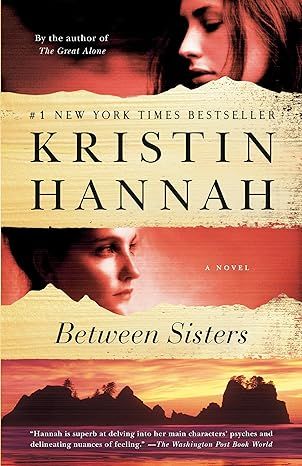
Between Sisters: A Novel (Random House Reader's Circle)
4.5
-
30,096
$8.89
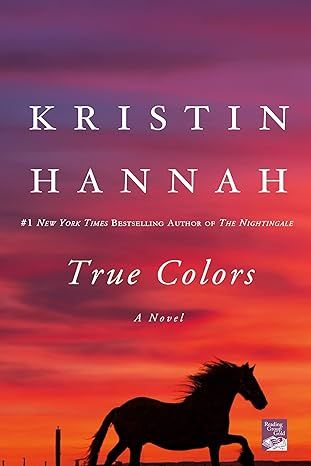
True Colors: A Novel
4.5
-
25,235
$2.14
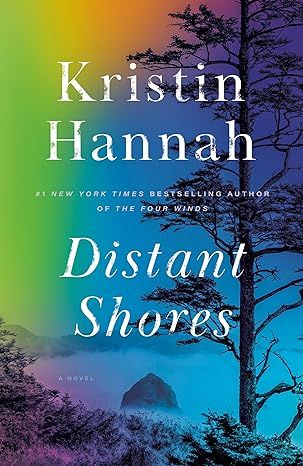
Distant Shores: A Novel
4.3
-
17,870
$8.72
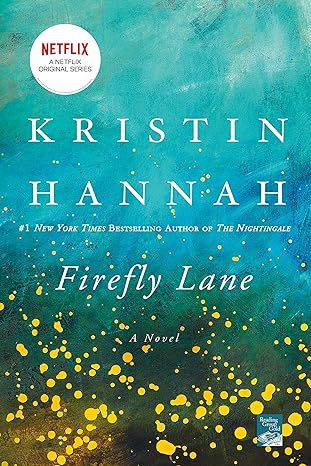
Firefly Lane: A Novel
4.6
-
49,632
$9.06
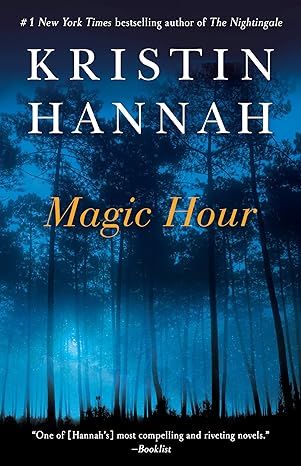
Magic Hour: A Novel
4.6
-
33,187
$8.99
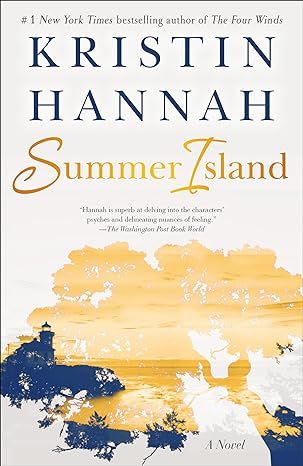
Summer Island: A Novel
4.4
-
28,592
$8.94
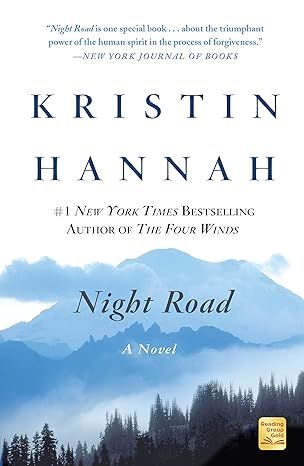
Night Road
4.5
-
37,965
$10.83

The Great Alone: A Novel
4.6
-
152,447
$5.49
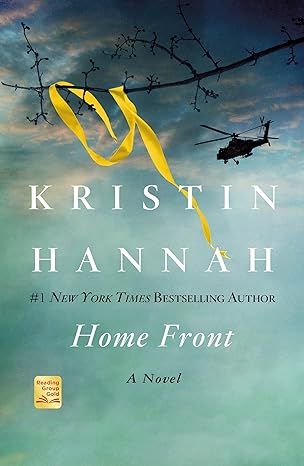
Home Front: A Novel
4.6
-
38,454
$8.00

Winter Garden
4.6
-
72,838
$7.37

The Nightingale: A Novel
4.7
-
309,637
$8.61
Best sellers
View all
The Tuscan Child
4.2
-
100,022
$8.39

The Thursday Murder Club: A Novel (A Thursday Murder Club Mystery)
4.3
-
155,575
$6.33

Sapiens: A Brief History of Humankind
4.6
-
140,302
$13.49

The Butterfly Garden (The Collector, 1)
4.3
-
88,556
$9.59

Things We Hide from the Light (Knockemout Series, 2)
4.4
-
94,890
$11.66

The Last Thing He Told Me: A Novel
4.3
-
154,085
$2.99

The Perfect Marriage: A Completely Gripping Psychological Suspense
4.3
-
143,196
$9.47

The Coworker
4.1
-
80,003
$13.48

First Lie Wins: A Novel (Random House Large Print)
4.3
-
54,062
$14.99

Mile High (Windy City Series Book 1)
4.4
-
59,745
$16.19

Layla
4.2
-
107,613
$8.99

The Locked Door
4.4
-
94,673
$8.53

